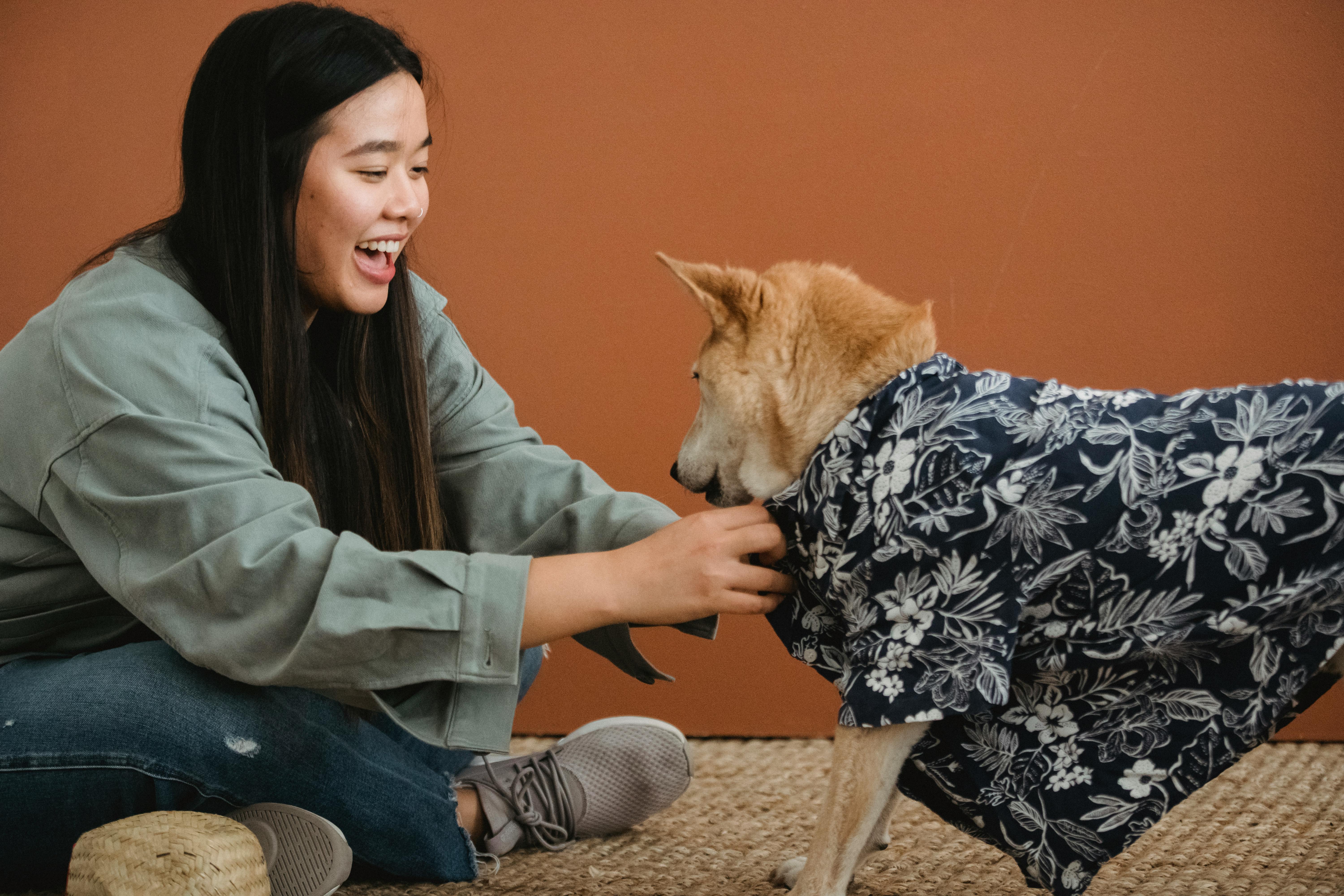How Long Does Dog Have To Wear Cone After Spay

Having your dog spayed is an important part of responsible pet ownership, but it can be uncomfortable for your pet afterwards. One of the most common post-surgical treatments is the “cone of shame” – a plastic or fabric cone that prevents your dog from licking their wound. If you’re wondering how long you should have your dog wear a cone after spaying, there are a few factors to consider. This article will provide an overview of how long dogs should wear a cone after being spayed, and what you can do to make the experience more comfortable for them.It depends on the individual dog’s healing process, but typically a dog should wear a cone after spay surgery for at least 10 days. After that, it is recommended to continue to monitor the incision site and keep the dog from licking or biting at it until it has healed completely.
Reasons for Wearing a Cone After Spaying a Dog
Spaying a female dog is an important part of pet ownership, and the recovery process is just as important. One of the most important parts of the recovery process is wearing a cone after spaying. A cone, also known as an Elizabethan collar, is designed to keep your dog from biting or licking at the incision site. This helps to prevent infections and other complications after surgery.
The cone also helps to limit your dog’s mobility. Dogs can often be too active after surgery, which can lead to further injury or even reopen the wound. The cone makes it difficult for them to move in certain directions, which helps them rest and recover more quickly.
Finally, wearing a cone helps prevent your dog from licking at the incision site, which can cause irritation and inflammation. It also prevents them from getting dirt or debris in the wound area, which can result in an infection. The cone ensures that your pup stays clean and safe during their post-operative recovery period.
Types of Cones Used After Dog Spay Surgery
The type of cone used after a dog spay surgery can vary depending on the size and breed of the dog. Generally, there are two types of post-surgical cones: Soft and hard. Soft cones are more comfortable for small dogs, while hard cones are better for larger breeds. It is important to make sure that the cone fits securely around the neck, as an ill-fitting cone can cause discomfort or even injury to the dog.
Soft cones are usually made from fabric and provide a lighter fit than a hard cone. This type of cone is designed to cover only the front and sides of the neck in order to prevent licking or biting at stitches or incisions. Soft cones are typically made with adjustable straps that allow them to fit comfortably around different sized dogs while still providing adequate protection.
Hard cones, also known as Elizabethan collars, are typically made from plastic or foam and provide more coverage than a soft cone. They extend further down the chest and back so that they cover more area and deter licking or biting at sutures or incisions. This type of cone is often bulkier than soft cones, making it difficult for larger dogs to navigate their environment with ease.
It is important to ensure that whichever type of cone you choose fits your dog properly in order to provide adequate protection without causing discomfort or injury. The decision between a soft and hard cone should be made based on size, breed, and activity level in order to maximize comfort and safety for your pup post-surgery.
Necessary Supplies Needed When Wearing a Cone
When wearing a cone, there are certain necessary supplies that must be on hand. These items will help make the process of wearing a cone more comfortable and safe. The supplies needed include: muzzle, eye patches, head halter, elbow pads, soft towel or blanket, and treats.
A muzzle is an important piece of equipment to have when wearing a cone. It helps to provide an extra layer of protection against accidental bites and scratches. Muzzles come in different sizes and shapes, so it is important to measure your pet’s snout before purchasing one.
Eye patches are also essential when wearing a cone. Eye patches help keep the cone in place by covering the eyes and preventing them from coming out of the cone while running or jumping around. It also helps protect the eyes from any irritation caused by rubbing against the edges of the cone.
A head halter is another important item to have when wearing a cone. This device wraps around your pet’s head and helps keep their head in place while they wear their cone. It also helps prevent them from accidentally pulling off their cone if they struggle too much or try to take it off themselves.
Elbow pads can be used to protect your pet’s elbows from rubbing against the edges of their cone. These pads should fit snugly around the elbow area and provide extra cushioning for comfort when walking or running with their cone on.
A soft towel or blanket can be used to line the inside of your pet’s crate or bed while they wear their cone. This will help keep them warm and comfortable during nap time, as well as providing an extra layer of padding for them in case they move around too much or bump into anything with their cone on.
Finally, treats are an important part of helping your pet stay calm while they get used to wearing a cone. Treats can be given throughout the day as rewards when your pet behaves properly with theircone on, which will help create positive associations with it over time and help make it easier for them in the long run!
The Benefits of Wearing a Cone After Spay
After having a pet spayed, it’s important to keep them from licking or biting at the incision site. Wearing a cone, also known as an Elizabethan collar, is a common way to do this. Not only does it protect the wound from being further irritated, but it also offers other benefits too.
For starters, wearing a cone helps to prevent infection by keeping bacteria and other contaminants away from the wound. This is especially important for pets that spend time outdoors or in contact with other animals that could carry diseases or infections. Additionally, wearing a cone can help reduce swelling and inflammation by preventing your pet from constantly licking the area.
Another advantage of wearing a cone is that it can help reduce your pet’s anxiety levels during recovery. Pets can become anxious when they are not able to lick and bite at the wound area, which can lead to further stress and possible complications. The cone will help keep them from doing this while also providing a visual deterrent that can help reduce their stress levels.
Finally, wearing a cone after spaying can help speed up the healing process by ensuring that the wound is kept clean and dry. This will allow your pet to heal faster and avoid any potential complications due to infection or inflammation.
Overall, wearing a cone after spaying is an important part of helping your pet recover quickly and safely. It provides numerous benefits such as preventing infection, reducing inflammation and swelling, reducing anxiety levels, and speeding up the healing process. Therefore, it should be considered an essential part of any post-surgical care plan for your pet.

How Long Should You Wait Before Removing the Cone?
When it comes to removing a cone from a pet, the amount of time can vary depending on the injury or situation. Generally, a cone should be removed after the injury or medical condition has healed enough that the pet no longer needs protection from further harm or irritation. In most cases, this means waiting until stitches have been removed and any wound is fully healed. It’s also important to make sure that any medications prescribed by a veterinarian have been administered for their full course before removing the cone.
In cases of skin conditions such as allergies or dermatitis, it’s important to wait until the area is no longer irritated and symptoms have subsided before taking off the cone. If there is any sign of infection, such as redness, swelling, pus or odor, then it is best to leave the cone on for an extra few days until these signs are gone.
If your pet is wearing a cone due to behavioral issues such as licking or biting wounds/bandages then it’s important to wait until they’ve outgrown their bad habits before removing it. This could take anywhere from several days to weeks depending on how persistent your pet is with their behavior.
Overall, it is best practice to consult with your veterinarian before removing a cone from your pet in order to ensure they are completely healed and free from further harm or infection. It’s also important to follow any instructions provided by your veterinarian regarding when it would be safe to remove the cone.
What is the Recommended Duration for a Dog to Wear a Cone After Spaying?
After spaying, it’s essential to monitor your dog’s recovery closely. Generally, the recommended duration for a dog to wear a cone is about 10 to 14 days. For pet owners, knowing what to know about dog cone duration helps ensure that the healing process is smooth and prevents unwanted complications.
What to Do if Your Dog Is Uncomfortable with the Cone
Dogs don’t always take kindly to the cone of shame, or Elizabethan collar, as it is sometimes known. It can be an uncomfortable and awkward experience for them to have to wear one for any length of time. If your dog is struggling with the cone, there are a few things you can do to help make them more comfortable.
First, it is important to ensure your dog has enough space so they don’t accidentally bump into objects or other people while wearing the cone. You may need to rearrange their living space so they have more room to maneuver and fewer obstacles in their way.
Secondly, it is also important that your dog is able to eat and drink comfortably while wearing the cone. You may need to purchase a special feeding bowl designed for use with the collar that allows them to eat without having their food spill out of the bowl due to the size of the cone.
Thirdly, it is also important that you provide plenty of attention and comfort when your dog is wearing the collar. This may include extra petting and cuddles or playing some fun games with them while they are wearing it.
Finally, you should also consult with your veterinarian about any additional advice or tips on how best to make your dog comfortable in their Elizabethan collar. They may be able to provide a specialized cone for your pup that better accommodates their size and shape or suggest other products designed specifically for this purpose.
By taking these steps, you can help ensure your pup feels as comfortable as possible while wearing their cone and make sure they have enough space and time adjust until their recovery period is over.
What to Do if Your Dog Is Not Wearing the Cone Properly
Cones, also known as Elizabethan collars, are a necessary part of pet care when your dog has a medical condition that requires extra protection. Unfortunately, some dogs just don’t like wearing them. If you’ve noticed that your dog isn’t wearing the cone properly, there are a few steps you can take to help.
First, make sure your dog is comfortable with the cone. The size should be appropriate for their size and shape so they won’t be struggling or trying to chew it off. You can also try putting something soft and comfortable inside the cone such as a t-shirt or towel so they feel more secure.
Next, consider using an alternative method of protection such as an inflatable collar or body wrap. These methods may be more comfortable for your pet and can provide adequate protection for their injury or condition while still allowing them to move around freely.
Finally, be sure to monitor your pet closely when they are not wearing their cone properly. This will help you catch any problems quickly and ensure that they are not licking or scratching at their wound or area of concern. If you notice any signs of distress or discomfort in your pet, contact your veterinarian right away so they can determine the best course of action for your pet’s health and safety.
Overall, it’s important to make sure that your dog is comfortable while wearing their cone and that they are adequately protected from further injury or infection. If necessary, consider switching to an alternative form of protection such as an inflatable collar or body wrap in order to ensure that your pet has the best possible experience while recovering from their injury or condition.

Conclusion
Ideally, a dog should wear a cone after a spay procedure for at least two weeks. This will help to prevent the dog from licking or chewing on their incision as it heals and to reduce their risk of infection. After two weeks, the cone should be removed and the wound should be monitored to ensure it is healing properly. While some dogs may need to wear the cone for longer, this should always be discussed with your veterinarian.
It is important to remember that recovering from a spay procedure can take some time and you may need to make adjustments in your pet’s lifestyle during this period. You may also need to provide extra care and attention during this time, such as monitoring their activity levels and providing them with extra comfort. By doing so, you can ensure that your pet has a successful recovery from their spay procedure.
In summary, dogs should wear a cone after a spay procedure for at least two weeks in order to prevent infection and aid in a successful recovery. If you are concerned about your pet’s recovery or have any questions about how long they need to wear the cone, speak with your veterinarian.
